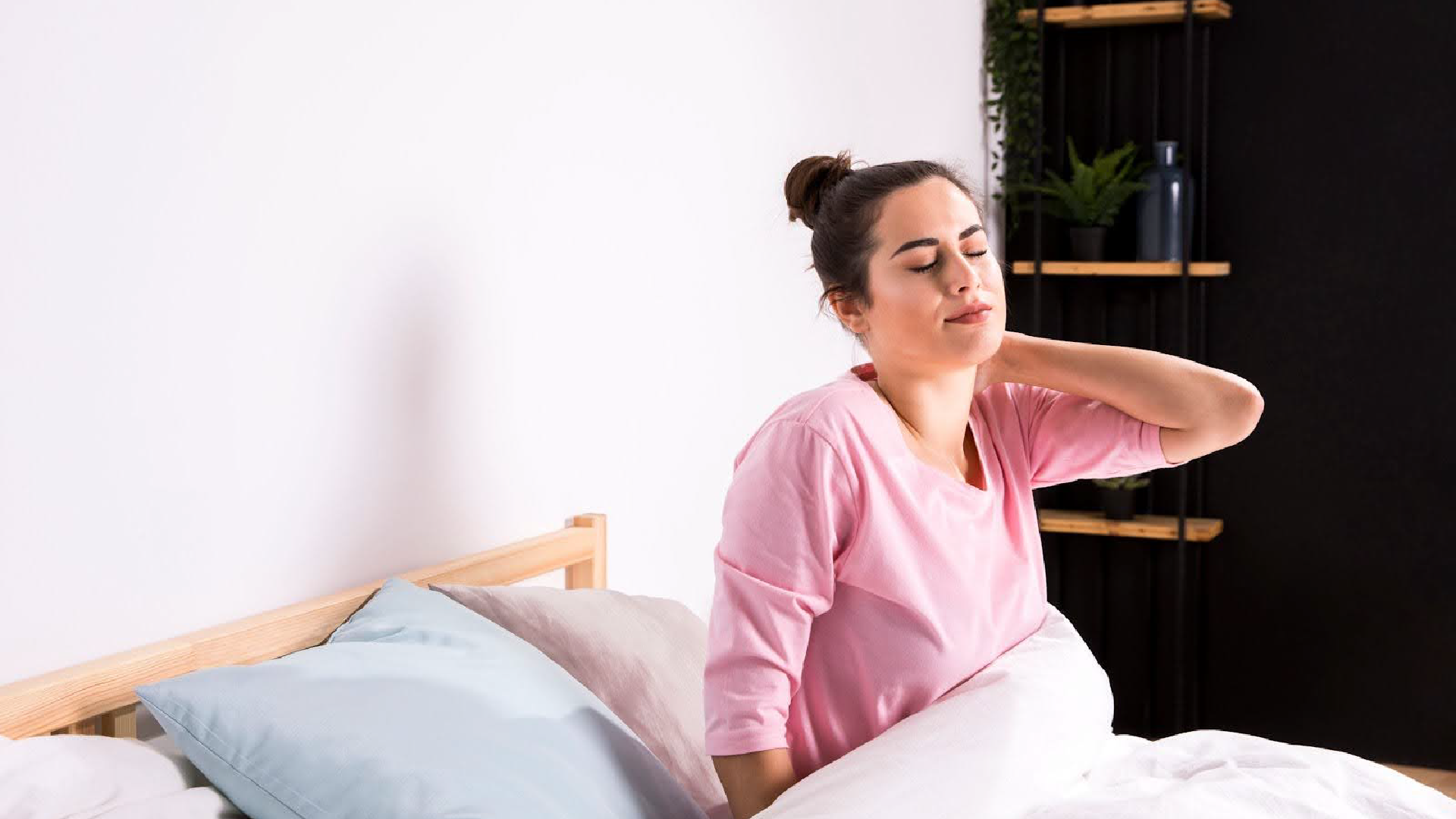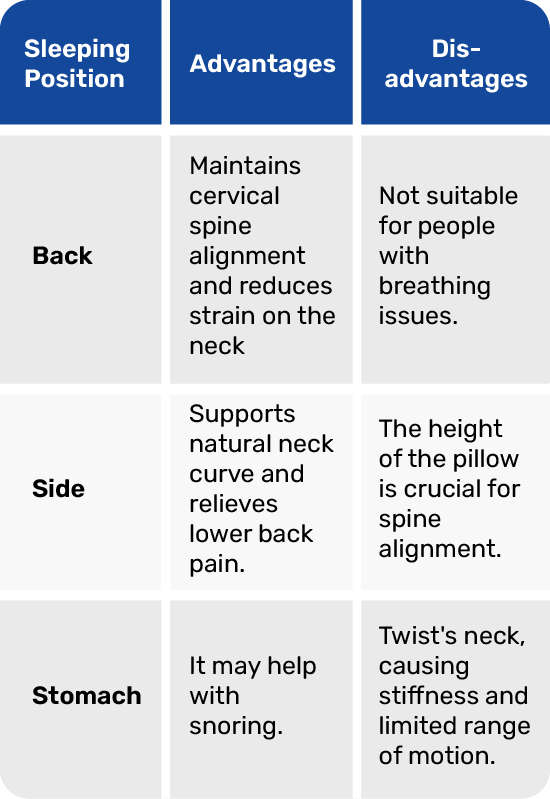

Waking up with neck pain can be caused by sleeping in an improper position. This puts strain on your neck muscles and can cause them to become stiff.
If your pillow or mattress does not adequately support your head and neck, it can cause your cervical spine to become misaligned. This can cause a sore neck and prevent you from getting a good night’s sleep.
Staying in a bad position for too long, whether you sleep or even during the day, can worsen your neck alignment. This leads to pain that just will not go away.
Factors such as stress and tight neck muscles also contribute to morning neck discomfort.
Adjusting your sleep position and selecting the correct type of pillow can help accelerate recovery and provide effective pain relief.
Waking up with neck stiffness or pain should not be a morning occurrence. However, many people struggle with this issue due to poor sleep habits or the way they position themselves at night. The causes of neck pain after sleep can be numerous, such as the type of pillow used or straining the neck muscles while sleeping. All these things can mess with your comfort and the way your neck lines up, leaving you with tight neck muscles. If sleep issues are causing you to start your day sore, it is essential to identify the root of your pain. The relief for your neck pain may be closer than you think.
Do you ask yourself why your neck hurts after you sleep? Neck pain that occurs after resting can often be attributed to factors that you can modify. The root of your pain may be related to your sleep habits. Poor posture can put extra pressure on your neck muscles. This may leave you sore and tense.
Sometimes, outside injuries or sudden movements at night can also exacerbate the pain.
If you know these reasons, you are one step closer to a day without pain. Continue reading to learn more about the causes of this common sleep issue.
Your sleeping position has a significant effect on neck alignment. If you twist your neck or fail to support it while sleeping, your muscles can become strained. This can also lead to neck stiffness in the morning. The curve that happens when your neck is in a bad spot can press against delicate muscles. That may cause sharp neck pain or tightness.
It is essential to maintain a neutral position for your neck to prevent these issues. When you sleep in awkward positions, such as curling up in a tight ball or lying mainly on one side, your neck alignment becomes off. This creates a site of compression on the neck and can cause pain or stiffness.
For pain relief and improved sleep, pay attention to your nighttime rest habits. Ensure your sleeping position provides adequate support for your cervical spine. This can help reduce the likelihood of neck stiffness and contribute to alleviating neck pain.
The pillow that supports your head at night can alter how your cervical spine aligns. If you do not use the correct type of pillow, such as one that is too hard or too flat, your neck may be misaligned and hurt after you wake up. Feather pillows will shape to your head, while memory foam pillows can help keep your neck in a more comfortable position.
If you sleep on a mattress that is too soft or sags, it will not support your spine as effectively as it needs to. This can lower your range of motion when you get up. If neck pain persists, a medium-firm mattress may help alleviate the discomfort in your body.
Your sleep setup matters a lot. The right mattress and the correct type of pillow will provide your neck with the support it needs, allowing you to alleviate neck pain and accelerate recovery.
The way you sleep can significantly impact neck, shoulder, and back pain. If you sleep in a way that puts your neck out of line with the rest of your spine, it can put stress on your muscles. When that happens, your muscles feel tight and stiff when you get up in the morning.
To help alleviate pain, choose a sleep position that reduces strain on your neck and the rest of your spine. With a few adjustments, such as sleeping on your back or side, you can achieve relief from neck pain and also alleviate shoulder pain. Let’s discuss the best sleep positions and what makes each one beneficial or detrimental.
Each sleeping position offers unique benefits and drawbacks for your neck health. Back sleeping keeps the natural curve of your neck intact, minimising stiffness and promoting a wide range of motion. Side sleeping, when paired with a supportive pillow, aligns your spine and neck. A pillow between your legs adds extra support.
Stomach sleeping, while a common habit, often leads to compressed neck muscles. This position requires prolonged periods of twisting your neck, which can exacerbate neck pain and stiff muscles.


Adjusting your sleeping position is a practical step toward achieving pain relief.
Changing the way you sleep can make a big difference to your mornings. Minor changes to your sleep position can help alleviate tight neck muscles and maintain proper spinal alignment. This enables you to achieve pain relief and promotes faster healing in your body.
Improving your sleep posture helps alleviate strain on your neck muscles during the night. This can help relieve neck pain, provide some pain relief, and even help soothe a stiff neck.
Daily habits can affect the health of your neck muscles. Stress from your day may continue when you rest. This can cause neck stiffness and neck pain.
How you live your life is essential. Activities such as poor posture at work or excessive TV viewing can exacerbate neck pain and stiffness. Using home remedies and making adjustments to your daily routine, such as your sitting posture, may help alleviate the causes of neck pain. These simple steps can help you feel better at home.
Stress does not just affect your mind. It can cause your neck and shoulder muscles to become tight. Over time, excessive stress can cause a sore neck every morning.
You can help with this by taking hot showers. Hot showers are known to relax tight neck muscles. The heat also helps blood flow in the neck. Additionally, engage in joyful movement, such as yoga or gentle stretching. It enables you to loosen up and brings effective pain relief for a sore neck.
Lowering stress is more than relaxing. It is about taking care of your neck muscles and your entire body, allowing you to experience better pain relief each day.
Simple things you do every day can have a significant effect on neck pain, even if you don’t think about it. Bad posture during a long commute or while you sit in front of the TV can slowly cause stiff neck muscles. Using multiple pillows when you sleep can put stress on your neck, which is not beneficial for you.
To help your neck feel better:
Developing better habits not only keeps your neck muscles and spine in line but it can also improve your overall life by helping you avoid neck discomfort.
Neck pain after sleeping can significantly impact your day. It may put you in a bad mood and make it difficult to accomplish tasks. There are many reasons for this kind of pain. It could be from the way you sleep, or the type of mattress or pillow you use. It is essential to know this. Adjusting your sleep position or reviewing your daily activities to identify potential tension-building habits can be beneficial. These steps are easy but can make a big difference.
Taking care of your neck is beneficial for both your sleep and overall health. If you keep having neck pain after sleep, you should talk to a professional. They can find what works for you. Your comfort matters. Take care of your neck pain today!
Waking up with neck pain is a common occurrence. It can occur due to poor sleep posture or excessive movement during sleep. If your neck alignment is off during the night, you may experience muscle stiffness upon waking in the morning. Your sleeping position can exacerbate neck pain, even if you didn’t feel any discomfort the night before. Old injuries can also add to this problem.
Yes, that is true—a pillow that does not give the proper support to your head and neck puts stress on your muscles. There are various pillows, such as memory foam or feather pillows, that help maintain a straight line for your neck and back. This makes pain relief possible. When you pick the correct type of pillow, you will have less tightness in your muscles while you sleep.
If your mattress is old or does not provide sufficient support, it can lead to neck pain. A bed that sags can cause your body and cervical spine to align improperly. This may put pressure on the neck muscles at the site of compression. You may want to consider a medium-firm mattress for improved spinal support and pain relief. This can help you feel better and prevent this pain from returning.
If neck pain is still there after using counter pain medications, or you have a hard time moving your neck, you need to get neck pain treatment from a professional. If you experience numbness, signs of a pinched nerve, or muscle weakness, it is also essential to consult a doctor. These problems should not be ignored, as they can limit your range of motion in your neck.
Several stretches can help alleviate neck pain. Gentle movements, such as turning your neck or performing a light massage, can help relax tight neck muscles. These can also help you heal and feel better. You may also want to use heat therapy in conjunction with your exercises to help soothe stiff muscles. This can help you feel more relaxed and move more easily, especially before bed.

Pioneering Interventional Pain Management
Delhi | Faridabad | Gurugram | Ghaziabad | Noida | Lucknow | Jaipur | Mumbai
© 2025 Nivaan. All Rights. Reserved